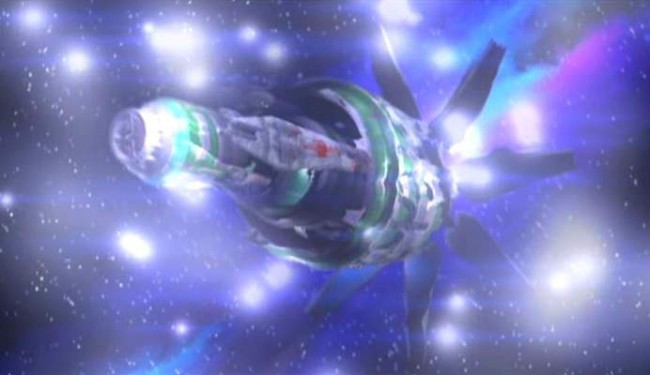
After the dramatic storm that was “Interludes and Examinations,” what should be a key moment in B5 history falls almost a little flat. This two-part episode, resolving the “Babylon Squared‘ time travel puzzle from Season 1, and finally setting the fate of Jeffrey Sinclair, is rollicking goodness, but for all that the stakes seem smaller, the drama a bit less intense, and the resolution, while neatly crafted, more admirable than gob-smacking.
Part of that is, in fact, the previous episode, where we left everything in a dire state — a nascent alliance against the Shadows, bolstered by Vorlon intervention, but with Kosh dead and Londo back tragically in Morden’s arms. This tale, split over two episodes, completely kills any momentum from that story.
(Though, somewhat in its defense, “Walkabout” was meant to be the next episode, but got swapped out for after this pair in order not to split the two-parter over one of PTEN’s mid-season hiatuses.)
More importantly, by trying to be the complement to “Babylon Squared,” the main narrative loses its own individual value. When I was in high school, I wrote a Star Trek short story telling the episode “Mirror, Mirror” from the perspective of the alternate universe Kirk & Co., trying to both mirror the “real” universe actions while fitting into the glimpses we saw on that other side. It was fun, it fulfilled its purpose — and it was just not a very good story because it was more about the clever artifice than being a good tale in and of itself. And that’s where “War Without End” falls short.
There’s largely one narrative plotline here, with a few side notes, and it’s a long one, so I’ll summarize a bit more by character than plot.
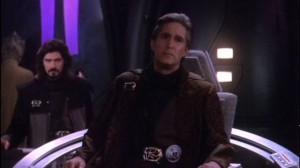
Jeffrey Sinclair: This is really his episode(s). Michael O’Hare had left the show under a cloud, staunchly defended by JMS but (so it was heavily rumored) kicked off B5 by the network for his uneven acting work — occasionally wooden, occasionally manic. (As it turns out, O’Hare was having serious mental illness issues, barely keeping it together until the end of the season, and resigning from the show rather than making production wait for him to get the treatment he needed. JMS kept that secret until well after O’Hare’s death.) This two-parter serves as a vindication for both the actor and the part. Sinclair goes from his critical work on Minbar as Entil’zha (leader of the Rangers) to an even more critical role: that of Valen, the religious Minbari leader who defeated the Shadows and formed the Grey Council (and whose presence began the transmigration of souls from Minbari to Humans).
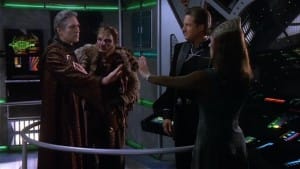
O’Hare does a solid job in the role, having evolved naturally from the Jesuit-educated wry observer of life to someone who can toss off cryptic Minbari or Vorlon aphorisms with practiced monastic ease. His Sinclair remains in control the entire time, as elder eminence early on, then, when Sheridan is unstuck in time, as the clear leader of the protagonists — taking over the command chair without hesitation (or anyone’s protest). Better yet, he moves from a man uncertain of his destiny, to one who learns of and embraces it, even while having a kind moment for those he’s leaving behind — Ivanova, Delenn, and, especially, Garibaldi.
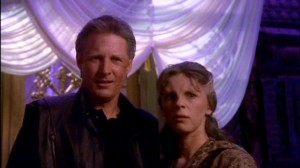
John Sheridan: It’s tough to be the Captain, then have the old Captain (well, Commander) come back in. The mutual respect between the characters is played up more than any rivalry — which would have been an easy cliche to fall into. Sheridan rolls, frustratedly, with the punches of being out of his depth in terms of understanding what’s going on, following both destiny and orders in a way that makes it clear he prefers to be the cowboy in charge. Boxleitner’s firing on all cylinders here.
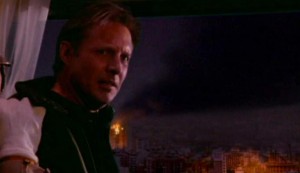
Yet he also gets some great scenes mid-way through. Unstuck in time, Sheridan flashes forward 17 years to where he and Delenn have been captured by the Centauri. Here’s destiny striking him in the face, and the challenge he will face in both preventing that future tragedy, and in making the good parts come true (his relationship with Delenn — no pressure! — and their resulting son, David) is an underrated aspect to this episode.
Learning that he’s one of the Ones — the One Who Will Be — is a huge burden. Will it steady him, or make him do some reckless shit? How about … both?
Delenn: Mira Furlan does an excellent job as the Minbari with a Secret once more, this time her knowledge of Sinclair’s destiny as Valen. That tragedy, even if they succeed (as they have to) overlays everything she’s doing, unaware as she is that Sinclair already knows the secret.
Her role on the mission is a mixed bag, serving as a chess piece for the different efforts (including turning out to be one of the figures in the blue 2001 space suits — which the fanboys had always assumed were the same mystery character, presumably Sinclair who was seen taking his off at the end of “Babylon Squared”). That’s balanced by an intensity in her scene during Sheridan’s flash-forward, both before she knows it’s past-Sheridan she’s hugging and kissing in a cell, and then when she’s warning him of how much Bad Stuff in his life lies ahead (you’re not helping, Delenn) despite the Good Stuff, and how, of course he must not go to Z’ha’dum. She also gets a nice flash-forward herself a few episodes to someone dropping in at Sheridan’s room in the middle of the night …
Delenn is the One Who Is. Her role has been in getting the ball rolling with all this conspiracy and prophecy and alliance stuff, serving as the heir of Valen and Dukhat, and as the trusted ally of Kosh. That role is now over — Dukhat is long dead, and she’s exorcized those ghosts; Valen’s prophecies are at an end and she knows his secret; and Kosh, of course, is now dead. Now she’ll be a partner with Sheridan, the One Who Will Be.
Mira Furlan here gets an array of things to do, and does most of them well. She does get a little over the top in the Centauri prison cell — it’s an intense moment, but Delenn seems far more out of control than feels right for her. Most of the time, though, she does her professional job.
Garibaldi: Poor Garibaldi. He gets stuck either expositing, or getting exposition thrown his way, and out of the main action regardless, all because of the whole “bouncing through time more than once can be hazardous to your health” shtick. Still, Jerry Doyle has some good moments — being unable to watch the last moments of future-Ivanova’s death, urgently certain that Sinclair must have left him a message (then having to guess the password).
Ivanova (and Marcus): They’re mostly along for the ride (and the badinage), tossing off quips and pushing buttons. This episode, unfortunately, emphasizes to me Claudia Christian’s limits as an actress. She’s good enough, especially working with a strong character like Ivanova, but her dramatic distress voice in the “destruction of B5” sequence just lacks the emotional oomph it should. That’s partly some poor words written, and maybe not the best direction, but the main weight needs to fall on Christian’s shoulders.
That said, one nice aspect to the episode was the reunion — and separation — of Ivanova with Sinclair, her mentor. Alas, the first scene (their meeting in C&C) got cut for time, and their farewell gets truncated for narrative blocking. A shame, that.
Marcus does get some good lines, and we get still more glimpses of the man hurling himself toward any opportunity for a brave, romantic death — offering, in this case, to pilot B4 back a thousand years. Alas, the beau geste is not for him — yet.
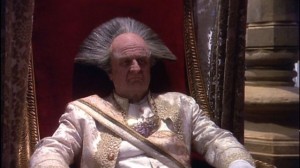
Londo: He only appears here in the flash-forward Sheridan goes through. It’s an astonishing role, though, nailed (as usual) by Peter Jurasik. It’s seventeen years forward, but Londo looks like he’s aged seventy — gray, shriveled, decrepit and coughing, hag-ridden by a Shadow-critter (first intro to that particular charmer), embittered by the devastation done to his homeworld, and (under the Shadowlings’ direction) more than happy to destroy Sheridan and Delenn for vengeance.
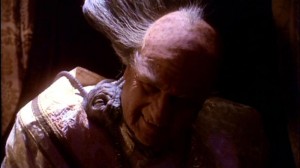
And yet — we also get the drunk-hag-ridden Londo, barely able to stand, but more rational and “himself” than before — one who’s willing to sacrifice himself to get Sheridan and Delenn to safety in exchange for their help freeing Centauri Prime … and willing to face his final fate at G’Kar’s similarly-worn hands.
A great job, both in writing and in acting.
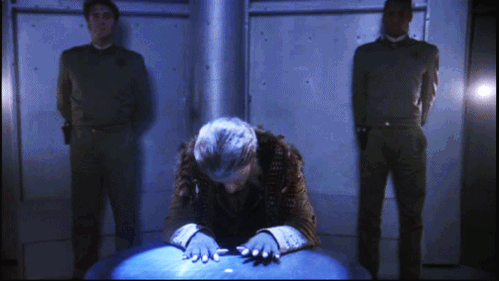
Zathras: Talking about the actors and roles would not be complete without mention of Tim Choate’s Zathras, all-around henchman for Draal and the mission, never understanding the epic nuances, but understanding more than you might think, tossing off space-idiot-savant wisdom with un-self-conscious aplomb as well as explicating major plot points.
ZATHRAS: All Minbari believe is around Three. Three castes: Worker, Warrior, Religious. Three languages: Light, Dark, Grey. The Nine of the Grey Council: Three times three. All is three– as you are three. As you are one. As you are ‘The One.” You are the One Who Was, you are the One Who Is, and you are the One Who Will Be. You are the beginning of the story, and the middle of the story, and the end of the story that creates the next, great story.
Zathras is the character everyone remembers from this episode, and with good reason. He carries crates, fixes widgets, and gets to play a key role in the second-episode Mystery of the Blue Suit. Not too shabby.
SINCLAIR: So you’re not to say anything to me that might change the past. Understand?
ZATHRAS: Yes, Zathras understand. No, Zathras not understand, but Zathras do. Zathras good at doings, not understandings. Zathras honored to meet you for many reasons. [To Sheridan] Zathras also honored to meet you for other reasons.
SHERIDAN: Such as?
ZATHRAS: Oh, no. Draal gave Zathras list of things not to say. This was one. No, not good. Not supposed to mention “One” or “The One”. You never heard that.
SHERIDAN: What else is on this list of things you’re not supposed to mention?
ZATHRAS: Zathras does not remember. But if Zathras remember later, Zathras tells you.
Overall Production: Time travel shows are hard to do well. Doing it when you’re coupling an episode from Season 1 with a revisit in Season 3 is even trickier. Doing that when you lost one of your stars (and a centerpiece protagonist to the plot) is insane. But JMS managed to write and produce (with Michael Vejar working well as director) these eps to do just that, and interleaves both original scenes and even individual shots to not only neatly complement the original story, but to expand the whole thing, and turn what was a whiz-bang episode into a key chapter of the overall saga. That makes it a special episode — but is also the ep’s fatal flaw (see below).
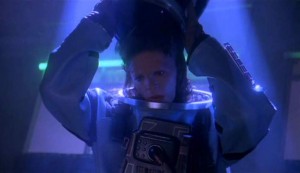
It’s worth noting two “gotchas” that get put in the story that radically defy what fanboys thought they understood from “Babylon Squared.” The first is the overturning of the (obvious) assumption that B4 was being pulled into the future as part of the up-and-coming Shadow War; that it turns out to be into the past for the previous war was a brilliant piece of misdirection, intended from the get-go. The second gotcha was the whole 2-Blue-Suit Monte trick, as everyone’s assumption that it’s Sinclair in the blue 2001 suit in the original episode (probably the initial intent) gets tangled up by having Sheridan in a blue suit as well, and then having it turn out that Delenn assumed Sheridan’s suit for the final scenes with Zathras; that was all pretty much made up for “War Without End,” but it works neatly.
(Here’s a key set of “Babylon Squared” scenes, which were edited partially into Part 2, which hits both of these.)
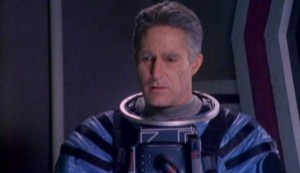
For the record, there are a few inconsistencies (including Sinclair’s weary “warning them” turning into his having tried to warn Garibaldi to watch his back). But the episodes pretty much feel consistent, and ultimately that’s what counts.
While Our Heroes (plus Zathras) are the majority of the cast, there are a couple of extras (beyond Zack, who does a good, workman job): the benighted Major Krantz and his lieutenant. Kent Broadhurst (Krantz) is a lot less panicky than he was in “Babylon Squared” — either an improvement in technique, direction, or a subtle shift in the story. His nameless lieutenant, played by Bruce Morrow, is another not-quite-tripping-the-furniture extra from B5 Central Casting, an unimportant role that’s still somehow diminished by a it of awkward acting.
The Episodes That Weren’t: Originally, the first half’s action was to have been driven by Draal, rather than Delenn. But Draal’s actor — his second actor — turned out not to be available. That shifted most of the mission start-up and exposition onto Delenn’s shoulders. Which actually works fine, since it builds her up, even though we lose some great lines:
SHERIDAN: You want me to steal Babylon 4? Are you out of your mind?
DRAAL [as a projection]: No, I’m out of my body. My mind is perfectly intact.
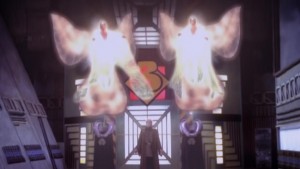
More important of a variation was, as mentioned above, Michael O’Hare’s departure from the show, which came after “Babylon Squared” was written and filmed, and which meant that Sinclair being around for the length of the series wasn’t going to happen, which mean rewriting the whole “missing puzzle pieces” of “War Without End” (and Sinclair’s final fate) from scratch. B5 suffered mightily from actors leaving before their arcs paid off — O’Hare’s was arguably both the most significant, but also the one which JMS recovered best from.
Overall: It’s an episode of great moments, careful crafting, drama, foreshadowing, and backstory-explicating. Yet for all that, it feels (especially on rewatch, much less so when it originally aired) more like only great moments, rather than a cohesive, inevitable story-driven whole, as “Interludes and Examinations” was. Too much of it is trying to fit the pieces together neatly into “Babylon Squared”– it does so, but at the expense of telling it’s own story. Still, it deserves to be on any B5 rewatch or Best-Of marathon.
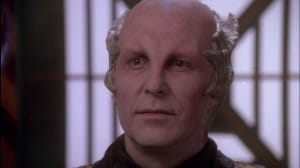
Most Dramatic Moment: For me, I guess, it’s the transmogrified Mimbarized counter-Chrysalised Sinclair standing on B4, two Vorlons at his shoulders, introducing himself to the Minbari soldiers checking the place out. Though, honestly, the original “Babylon Squared” Zathras-under-a-pillar chat with Sinclair still gives me chills (“You have a destiny!”), Sinclair unsuccessfully trying to warn Garibaldi to watch his back, and drunk-yet-in-control Londo asking Delenn and Sheridan to help his people are all great moments.
Most Amusing Moment: Any time Zathras is on screen, especially “Zathras is used to be beast of burden to other people’s needs. Very sad life. Probably very sad death. But at least there is symmetry.” Okay, it’s funnier when you hear it.
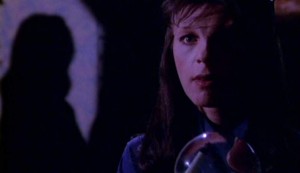
Most Arc-ish Moment: Sheridan as Valen nails down some huge amount of background story. Londo telling Sheridan about how the Shadow War turned out is unexpectedly both happy and dire at the same time. Londo and G’Kar in their final scene, explained, fulfills future-looking prophecy (in a delightfully twisted fashion). Flashforward-Delenn warning Sheridan about the pain to come (aside from their successes and their son) is chilling. But I’ll have to leave it with Delenn’s flash-forward (though only a few episodes.) “Hello.”
Overall Rating: 4.3 / 5 — Some great moments, beautifully crafted, but hampered by some acting issues and being more of a puzzle solved than a story told. (Rating History)
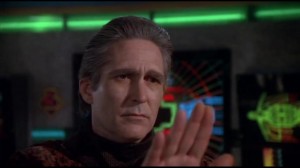
Other Resources for this episode:
- Lurker’s Guide – Part 1, Part 2
- Babylon Project Wiki – Part 1, Part 2
- IMDb – Part 1, Part 2
- AV Club
- Kay Shapero – Part 1, Part 2
- TV Tropes – Part 1, Part 2
- Sci-Fi Musings – Part 1, Part 2
Next episode: “Walkabout,” where Sheridan takes the war to the Shadows, Franklin’s story meanders onward, and there’s a New VIP on B5 …
(Google+ links to this post here and here.)
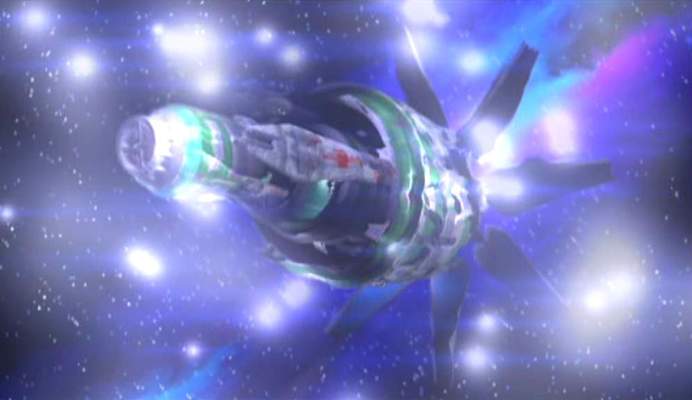
6 thoughts on “B5 Rewatch: 3×16, 3×17 “War Without End” (Parts 1 and 2)”